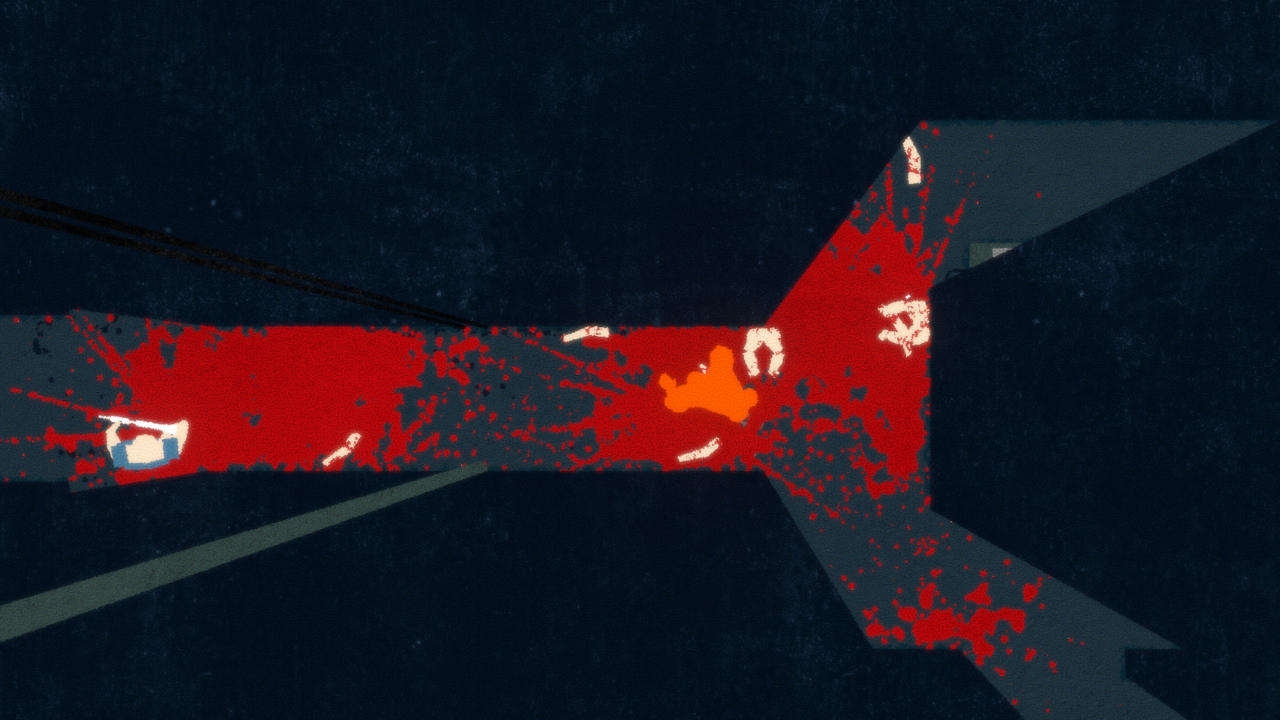Ape Out is, at heart, a game about jazz. The soundtrack is crafted by your improvised actions as you careen a runaway ape through the game’s levels, leaving a path of destruction and bloodshed in your wake. It’s high energy and exciting, even if, by the end, it feels like you’re playing the same basic tunes over and over.
It's a very simple game, at least in terms of how it's played--You're an ape, and you must run through each level without getting blown up or shot three times by human enemies. The camera is positioned above you, giving you a Hotline Miami-esque omnipotence when it comes to where your enemies are positioned. You can push enemies, who will splat and die if they hit a solid object, or you can grab them, at which point they'll fire at least one shot from their gun straight forward, hopefully into another person. A grabbed enemy can be thrown with more precision, which is especially handy if they're wearing an explosive pack, which will blow up and take out anything within its blast radius. You'll spend most of your time running forward, smacking enemies as you go, occasionally snaking away to avoid a mob or stopping to rip a steel door off its hinges.

But the way Ape Out elevates its relatively straightforward gameplay loop is by evoking the feeling of creating music, thanks to Matt Boch's captivating procedural soundtrack, which generates a drum-heavy percussion beat under the action. During lulls, the music fades to a calm, but when the action gets frenetic the drums and cymbal crashes kick in hard, and there are occasional horns and contextual changes depending on what's happening in any given stage. Additionally, the levels are presented as though they were albums, with each new subsection representing a track, complete with transitions from Side A to Side B at the midway point. It's a fascinating system which gives those moments where you're in the middle of a killing spree a significant extra kick. It's a repetitive game--you're ultimately doing the same thing continually over the whole course of the game--but it can also be quite propulsive and thrilling, especially when you're on a good run.
The stages themselves are starkly designed, with limited color palettes and simple geometric shapes. The ape itself is a single orange shape, and enemies are demarcated by a handful of different designs. There's a slight film grain effect over the action that gives everything a subtle jittery quality, and the album motif is even baked into the loading screens, which make the faint scratching noises of a vinyl record that is left on the turntable after the music has finished. The game’s greatest strength is how defined and consistent this aesthetic is. The unique art blends perfectly with the soundtrack, making the game's violence a bit more palatable than it might have otherwise been, and its boldness pulls you into the action very well.
It's great that Ape Out has so much style and flair, because it's essential to your investment due to the game's lack of variety. There are slight variations in how each level operates--the third album, for instance, features combustible liquids that can create walls of fire if you throw an explosives expert into them, and in the second (and best) album there are windows that riot police can rappel through--but they never dramatically alter how you need to play the game. A few new enemy types pop up, but the methods you use to deal with them never really change. There are a handful of good sections where the lights go out and you need to track enemy movements based on the beams of their flashlights, and they highlight how much the game could have benefited from more interesting gimmicks and variety. It’s a shame that Ape Out isn’t more playful, because whenever new ideas are introduced, they’re always welcome--there just aren’t that many of them. The game is short, yet some levels still feel superfluous and samey. I kept hoping a level would come along that would fundamentally change how I had to play, but this never happened.
Levels are semi-procedurally generated, so while some landmarks and choke-points will always pop up in roughly the same spot, the exact layout and enemy placements will change. This means that you'll sometimes find yourself in situations where a huge number of enemies swarm you at once, and properly defending yourself is all but impossible. Several times I encountered enemies wearing explosive vests and found that avoiding both their blast radius and gunfire from another enemy was frustrating and futile. The game isn't too difficult on the default difficulty, although there are occasional spikes when a level is a bit longer, which gives enemies more time to put bullets into you.

Ape Out is a game that draws you in with its strong aesthetic style and flair, but it feels short on ideas. When you're barrelling through a room, knocking multiple enemies into walls and watching them explode into puddles of blood, it can be quite exciting. But the game never really rises above being a mild thrill, and a lack the variety means that it’s too repetitive to truly make a strong impact. Ape Out isn't as creative with its level designs and challenges as it is with its soundtrack and art, but as it stands it’s a pleasant, jazzy way to spend a few hours.



















